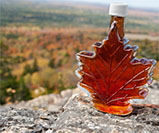
Submitted
The sustainability of maple syrup will be studied from 2026 to 2036 with the help of a grant.
UVM researchers embark on long-term study of the signature Vermont product’s future outlook
Maple syrup conveys an image of healthy forests and a sustainable product made by farmers stewarding the land. Yet, there is little data available about how sustainable the industry is.
The maple sustainability Indicators project, funded through the UVM Food Systems Research Center’s sustainability metrics grant, will develop a framework of indicators to evaluate the sustainability of the maple sector, according to a mid-December news release. By establishing monitoring programs, the research team will begin to investigate if the industry’s positive environmental image can be verified.
“The program will evaluate the impact of maple syrup business activity in the northeast United States,” UVM Extension Associate Professor Mark Cannella said. “Over 80% of the U.S. domestic syrup crop is produced in Vermont, New York, and Maine, and the industry has demonstrated rapid growth over the past decade.”
Cannella leads the research alongside a team of specialists in economics, forestry, natural resource management, community development, and stakeholder engagement.
The monitoring programs will also reveal risks, challenges, or weaknesses in the maple syrup industry’s objective to be sustainable.
“This project will take the big step of measuring indicators related to communities, economies, and the environment to develop a more holistic understanding of how maple production impacts people and the planet,” Cannella said, “and it will inform the industry of existing successes and weak points that individual producers and broader industry initiatives could focus on improving.”
UVM Extension Maple Specialist Mark Isselhardt is also a researcher on the team, focusing on production statistics and best practices like the use of a reverse osmosis system to remove excess water from the sap before boiling, which reduces energy use.
“I think there are going to be some parts that surprise people — some people might think everything about sugaring is sustainable, but when you start factoring in on all the plastic use and tubing and where the electricity is coming from, there are parts that are less green,” Isselhardt said.
The framework also includes a 10-year monitoring program from 2026 through 2036 that will identify methods, frequency, and resource needs for longer term measurement of key indicators.
“With the evolution of new practices, dynamic markets, community transitions and ecological processes, a long-term monitoring program will be able to assess progress towards stated goals of improved sustainability,” Cannella said.
The UVM Food Systems Research Center (FSRC) is the first USDA-funded research center to study the interconnectedness of all parts of a regional food system, from farm practices to food access. They work to uncover solutions to pressing issues through the lens of food and farming. As pioneers in USDA-funded research, the FSRC is at the forefront of discovering how what’s on our plate affects our society and the planet.



